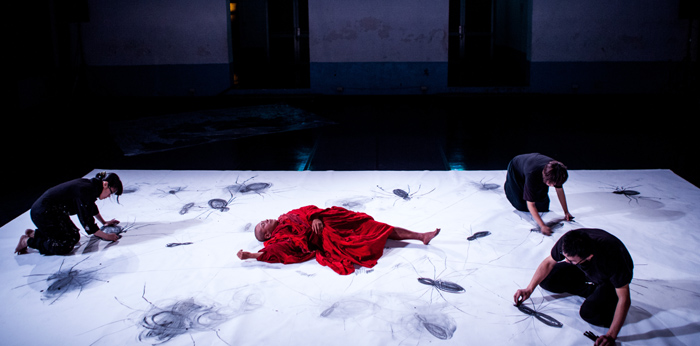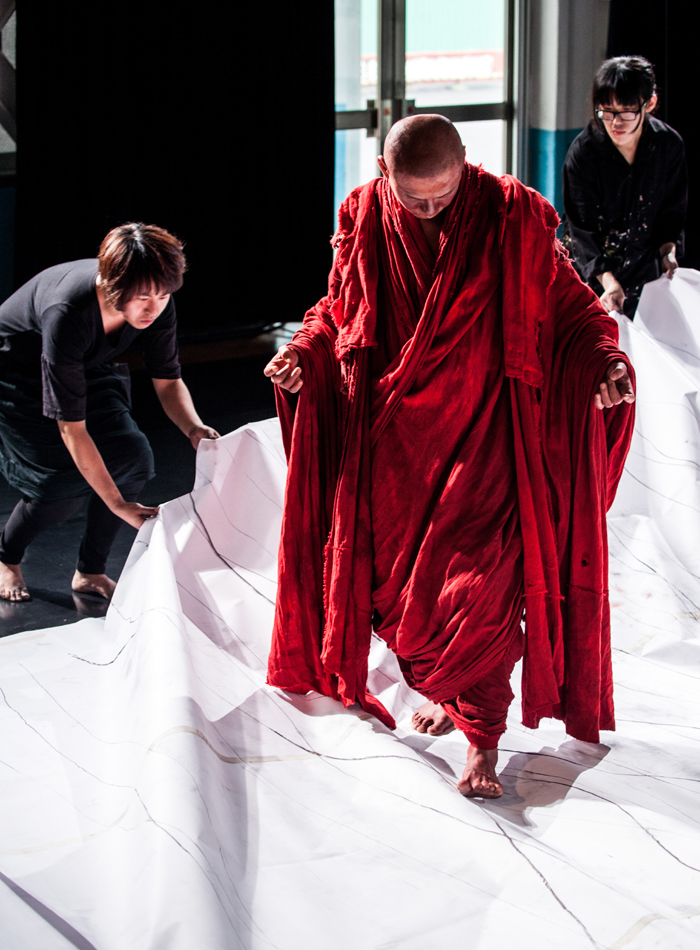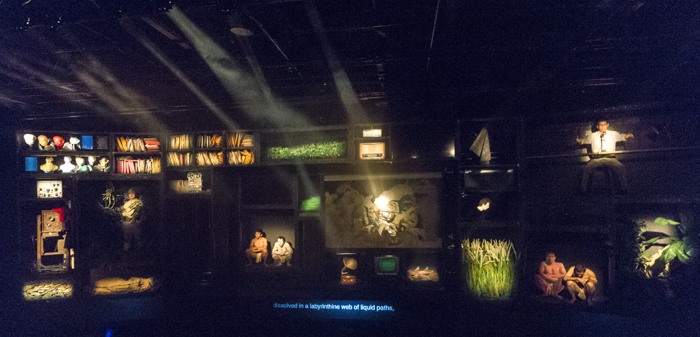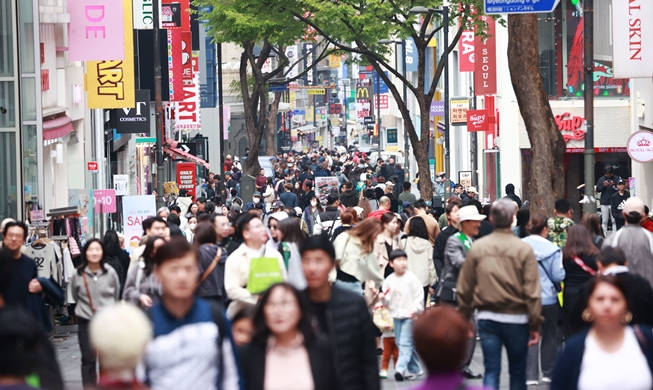-
 Korea.net's 24-hour YouTube channel
Korea.net's 24-hour YouTube channel- NEWS FOCUS
- ABOUT KOREA
- EVENTS
- RESOURCES
- GOVERNMENT
- ABOUT US
On a large sheet of white paper lies a monk from the seventh century Tang Dynasty, not budging at all, as a series of spiders crawls around and toward him.
This is a scene from “The Monk from the Tang Dynasty,” a play co-produced by the Asian Arts Theatre, part of the Asian Culture Complex in Gwangju, and under the leadership of Taiwanese director Tsai Ming-liang. It is currently on stage at the 2014 Vienna Festival in Vienna, Austria, an annual festival that kicked off on May 9 and continues until June 15.

Hailed as one of Taiwan’s most celebrated directors, Tsai Ming-liang is known for winning one of the most-coveted Golden Lion awards for his 1994 work “Vive L’Amour” at the Venice Film Festival.
In his newest stage work, “The Monk from the Tang Dynasty,” a monk in a red robe wakes up after a long sleep and starts drinking a drop of water and eating an apple very slowly. Then he leaves the stage without saying a word as the curtain closes.
Since it premiered during the festival, the work has received rave reviews, saying that it allows viewers to reflect upon themselves as they, too, are accustomed to speedy, hectic lives, and they see on the screen the use of complete “silence” and the aesthetics of “slow,” as displayed by the monk.

“I gave quite a lot of contemplation to this work, coming up with ways to effectively deliver each and every feeling of ‘slowness,’” said the Taiwanese director. “It is just up to the audience to appreciate the feelings. It’s like facing ‘time’ head on, in real time.”
“I’ve been to international film festivals in Busan and Gwangju. I believe in the tenets of the Sacheonwang, the Four Heavenly Kings of the Buddhist faith. I believe that Korean audiences will really be able to appreciate this play,” he continued.
Another joint work has also been catching global eyes in Vienna. “Ten Thousand Tigers” is a collaboration between the same Korean theater and the Singaporean artist and director Ho Tze Nyen.

Ho Tze Nyen has put together a dramatic series of dioramas that reconstruct the myths surrounding the tiger, an animal much-feared by human beings. The piece sends its message through the exploration of the tiger: humans and animals are inseparable.
The two joint productions premiered at the festival this year and will serve as curtain-raisers when the Asian Culture Complex is completed next year.
The Gwangju-based complex is a cultural space aimed at allowing active cultural and arts exchanges between countries, as well as spreading Asian culture farther afield around the world.
“We’ve been pushing ahead with joint projects like these plays, in cooperation with other international artists and organizations, at global events such as the Vienna Festival, the Kunstenfestivaldesarts in Brussels and the Esplanade Theatre in Singapore,” said an official from the Asian Culture Complex.
“The complex will lead such global joint productions and at the same time, will become the heart of creating and producing diverse performances and arts.”
By Sohn JiAe
Korea.net Staff Writer
jiae5853@korea.kr
This is a scene from “The Monk from the Tang Dynasty,” a play co-produced by the Asian Arts Theatre, part of the Asian Culture Complex in Gwangju, and under the leadership of Taiwanese director Tsai Ming-liang. It is currently on stage at the 2014 Vienna Festival in Vienna, Austria, an annual festival that kicked off on May 9 and continues until June 15.

“The Monk from the Tang Dynasty” is jointly produced by the Asian Arts Theatre of Korea and is directed by Tsai Ming-liang from Taiwan.
Hailed as one of Taiwan’s most celebrated directors, Tsai Ming-liang is known for winning one of the most-coveted Golden Lion awards for his 1994 work “Vive L’Amour” at the Venice Film Festival.
In his newest stage work, “The Monk from the Tang Dynasty,” a monk in a red robe wakes up after a long sleep and starts drinking a drop of water and eating an apple very slowly. Then he leaves the stage without saying a word as the curtain closes.
Since it premiered during the festival, the work has received rave reviews, saying that it allows viewers to reflect upon themselves as they, too, are accustomed to speedy, hectic lives, and they see on the screen the use of complete “silence” and the aesthetics of “slow,” as displayed by the monk.

A scene from “The Monk from the Tang Dynasty,” put on by the Asian Arts Theatre of Korea and under the leadership of Taiwanese director Tsai Ming-liang.
“I gave quite a lot of contemplation to this work, coming up with ways to effectively deliver each and every feeling of ‘slowness,’” said the Taiwanese director. “It is just up to the audience to appreciate the feelings. It’s like facing ‘time’ head on, in real time.”
“I’ve been to international film festivals in Busan and Gwangju. I believe in the tenets of the Sacheonwang, the Four Heavenly Kings of the Buddhist faith. I believe that Korean audiences will really be able to appreciate this play,” he continued.
Another joint work has also been catching global eyes in Vienna. “Ten Thousand Tigers” is a collaboration between the same Korean theater and the Singaporean artist and director Ho Tze Nyen.

“Ten Thousand Tigers” is a joint production between the Asian Arts Theatre, part of Korea's Asian Culture Complex, and the Singaporean artist and director Ho Tze Nyen.
Ho Tze Nyen has put together a dramatic series of dioramas that reconstruct the myths surrounding the tiger, an animal much-feared by human beings. The piece sends its message through the exploration of the tiger: humans and animals are inseparable.
The two joint productions premiered at the festival this year and will serve as curtain-raisers when the Asian Culture Complex is completed next year.
The Gwangju-based complex is a cultural space aimed at allowing active cultural and arts exchanges between countries, as well as spreading Asian culture farther afield around the world.
“We’ve been pushing ahead with joint projects like these plays, in cooperation with other international artists and organizations, at global events such as the Vienna Festival, the Kunstenfestivaldesarts in Brussels and the Esplanade Theatre in Singapore,” said an official from the Asian Culture Complex.
“The complex will lead such global joint productions and at the same time, will become the heart of creating and producing diverse performances and arts.”
By Sohn JiAe
Korea.net Staff Writer
jiae5853@korea.kr
Most popular
- First hearing-impaired K-pop act hopes for 'barrier-free world'
- 'Mad Max' director impressed by 'cinema-literate' Korean viewers
- Romanian presidential couple visits national cemetery
- 'Korean mythology is just as wonderful as Greek and Roman'
- Hit drama 'Beef' wins awards from 3 major Hollywood guilds













